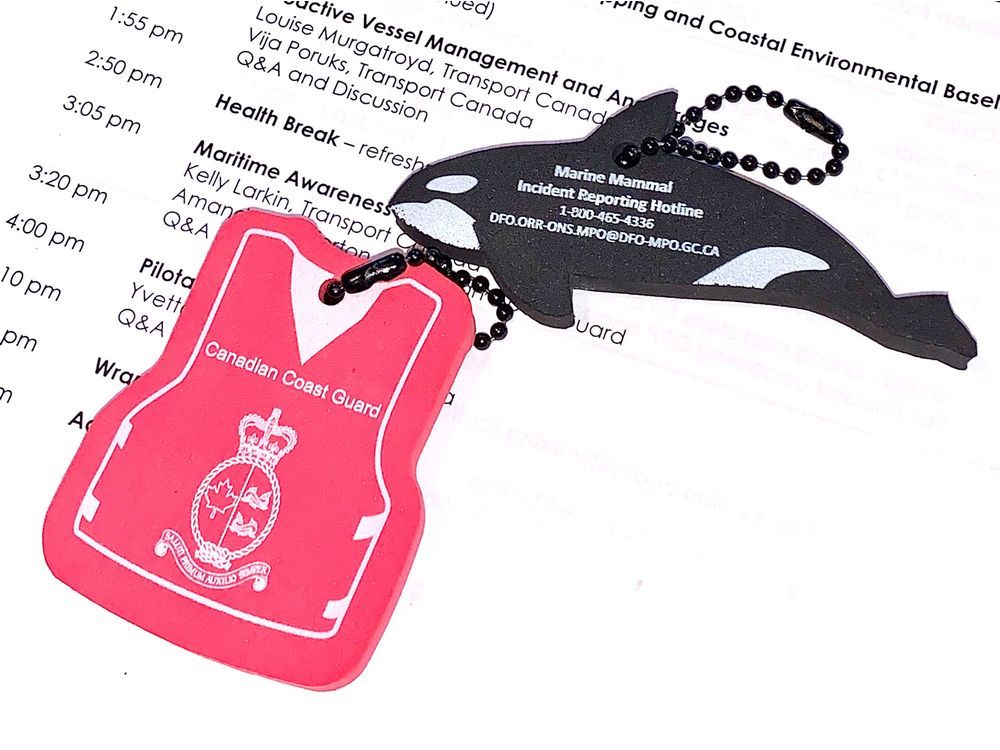Federal government handed out foam orca key chains at Vancouver ocean cleanup conference

Credit to Author: Tiffany Crawford| Date: Wed, 12 Feb 2020 21:21:11 +0000
The federal government will be reviewing its use of promotional swag after employees handed out foam key chains at a conference in Vancouver to talk about — among other things — how to rid the ocean of foam.
The gaffe has called into question whether businesses and groups should hand out plastic promotional items at conferences, especially at a time when the government is moving to ban single-use plastics.
John Preissl, who attended the federal Ocean Protection Plan conference two weeks ago at the Holiday Inn on West Broadway on behalf of the Burnaby Mountain Stream Keepers, filled out a complaint form after he realized hundreds of foam key chains shaped like orca whales and life jackets were being handed out to delegates.
He said one of the topics at the conference was how to deal with problems like polystyrene foam pollution in the ocean.
Preissl said nearly 300 members of the Ocean Protection Plan were chatting about ghost gear and polystyrene issues in Canada’s oceans and lakes, while the coast guard and other government employees were “giving away the cheap foam key chains like candy.”
“You can’t make this stuff up,” he said.
This photo by environmental steward John Preissl shows the foam key chains the federal government’s Ocean Protection Plan handed out at a conference in Vancouver.
As an avid kayaker and environmental steward for more than two decades, Preissl has seen heaps of plastic garbage in the water, and says the federal government can do better.
“Everything from plastic, foam, water bottles, plastic water bottle caps, beer cans, tons of commercial prawn/oyster traps, ghost fishing gear, nets, more rope than I care to remember, boats, derelict boats, anchors, plastic buoys, plastic bags, Tim Hortons and Starbucks coffee cups, and dock wood and plastic,” he said.
John Preissl, an environmental steward with the Burnaby Stream Keepers, says he sees so much plastic garbage in the water when he is out in his kayak. Photo: Debbie Preissl.
Preissl said when he raised the issue of the key chains with an Ocean Protection Plan manager she seemed to be aware that it had been a mistake.
Jane Deeks, a spokeswoman for the Department of Fisheries and Oceans (DFO), said the key chain wasn’t meant for single-use and includes the phone number for the marine-mammal-incident reporting hotline to remind the public of reporting on infractions they may witness.
However, she also said the DFO would review its use of swag at conventions.
“As a department, we will be reviewing our approach with respect to the use of such promotional items while ensuring that Canadians are adequately informed and are aware of the importance of programs we deliver,” she said in an email.
She said the federal government is taking “bold action” to ban harmful single-use plastics and ensure that companies take full responsibility for collecting and recycling waste.
A report last week from Environment and Climate Change Canada found overwhelming evidence that plastics are detrimental to wildlife and human health. The federal government is moving ahead with a ban on single-use plastics by 2021.
Fisheries and Oceans Canada and the Canadian Coast Guard have a directive to restrict the purchase and use of single-use plastics for federal government meetings, events and conferences, added Deeks.
Jonathan Strauss, president of the Promotional Product Professionals of Canada, says the estimated $2-billion industry is definitely changing, and there is a focus on materials that are more sustainable. He said at a recent trade show in Vancouver that products made from bamboo, recycled materials and items such as metal straws were the most popular promotional products among buyers.
Apparel is still a popular promotional item, but the companies that make them are looking at more sustainable fabrics, such as hemp and bamboo. At the trade show, one firm was offering reusable sandwich bags to use instead of plastic bags, while another company had created s promotional item with flowers that can be planted to help the bee population thrive, said Strauss.
“This is top-of-mind for consumers and companies,” he said. “The economy is changing and we are always looking for new ways to be more sustainable.”
Strauss said while many promotional items are still being made out of plastic, companies are looking at replacing those materials. Hemp, for example, is an environmentally friendly alternative, but cost is still an issue.
“I think we are going to see more hemp items over time as the cost comes down,” he said.
Foam float key chains are often used by boaters so they don’t lose their keys in the water. However, Preissl argues that they aren’t very good quality, and they don’t need to be handed out for free to hundreds of people who may not use them. He worries they could be discarded and consumed by marine wildlife.
Meantime, polystyrene foam, mainly from the aquaculture industry, is one of the biggest contributors to marine debris, along with derelict fishing gear, and abandoned vessels, according to a B.C. government report last week.
Single-use plastic items such as cups, cutlery, straws and bags are also major pollutants of the ocean, and represent significant health threats as they break down into micro plastics.
A girl shovels polystyrene beads from a beach on Lasqueti Island, central Georgia Strait.
Polystyrene foam is shown washed up at Anderson Bay Provincial Park on Texada Island, B.C. A B.C. government report published this week found foam from the aquaculture industry, abandoned vessels, and derelict fishing gear are some of the biggest contributors to marine debris and plastic pollution in the ocean.
https://vancouversun.com/feed/